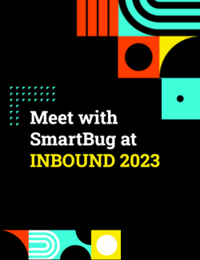
Artificial intelligence (AI) technology is revolutionizing marketing as we know it. Marketers are using AI to target the right customers with the right message at the right time. In the marketing sector, AI presents an opportunity to increase campaigns’ efficacy, boost revenue, and build stronger relationships with customers.
At SmartBug, we’re currently using AI tools to help us with blog writing, social media post creation, SEO optimization, data analysis, sales support, email marketing, and more. But we also wanted to learn more about how other marketing experts are using AI. From talking with these industry experts, we identified eight key ways marketers are harnessing AI to support their marketing efforts.
Content Creation
Given the size of this goal, it's important to set up checkpoints to monitor progress and hold ourselves accountable. Here's how you might do it:
- Content marketing: After creating a content calendar, you can set a checkpoint for every week when a new blog post is published. Measure the number of views, shares, and comments each post receives. This will provide you with immediate feedback on what topics resonate with your audience, which can guide your future content creation.
- SEO optimization: After identifying high-volume keywords and incorporating them into your content, set a monthly checkpoint to monitor your site's SEO performance. Look specifically at your ranking for targeted keywords and organic traffic numbers. If you find that you're not making progress, it might be time to reassess your keywords or SEO strategy.
- Targeted ad campaigns: For your ad campaigns, it would be beneficial to set a monthly checkpoint. Monitor key metrics such as click-through rates, conversion rates, and overall traffic from ads. If your ads aren't generating the expected results, it could indicate that they need to be better tailored to your target audience or that the budget needs to be adjusted.
Through these checkpoints, you can regularly measure and evaluate your progress toward your SMART goal. Doing so will allow you to stay on target, make necessary adjustments, and celebrate your progress. Remember, the process of reaching your goals should be dynamic and adaptable, not rigid. Regularly assessing your progress will help you be confident you're moving in the right direction and getting closer to achieving your goal.
Celebrate Successes
It should be no surprise that AI plays a pivotal role in content creation by helping marketers craft highly targeted and personalized messages. Machine learning algorithms can analyze vast amounts of data to understand consumer behavior, interests, and engagement patterns. This insight allows marketers to quickly create content that will resonate with their audience.
Ally Nichols, Marketing Director at Digital Brew, says, "We use ChatGPT to help us come up with concepts for scripts, as well as Midjourney to use in mood boards we send to our clients."
AI-powered tools can auto-generate simple content such as social media posts, email newsletters, or product descriptions, thereby saving marketers time and effort. Natural language processing and generation tools can even produce long-form blogs or articles that read as if they were written by a human, taking content personalization to a whole new level.
"Storyroom helps us generate content briefs,” says Hannah Shain, VP of Marketing at Relo Metrics, “and then I feed those briefs into Jasper to write my blogs."
Jen Frentz, Marketing Manager at Global Tax Network, chimes in:
"Currently we are using ChatGPT to help with various writing tasks. I use it to create first drafts of social media posts, blogs, emails, etc. I also use it to enhance our writing. I will write a first draft and include all of the bullets that need to be included, then ask ChatGPT or TinyWow to enhance it or make it clearer."
Data Analysis
AI in marketing takes data analysis to new heights by saving time. In the era of big data, marketers are inundated with a wealth of information, and interpreting it manually can be overwhelming. This is where AI comes in.
AI-powered tools can rapidly sift through vast amounts of data, pinpointing trends, patterns, and correlations that might go unnoticed by the human eye. For example, predictive analytics combined with AI can forecast future purchasing behaviors based on past customer actions. AI can also perform sentiment analysis on social media data, providing insights into consumers' perceptions and attitudes toward a brand or product.
A good AI tool's ability to deliver real-time analytics allows marketers to make timely and data-driven decisions, optimizing campaign performance and boosting ROI. This level of precision and speed in data analysis makes AI an invaluable asset for marketers aiming to maximize their data's potential.
Search Rankings and SEO Strategies
Artificial intelligence has revolutionized the field of search engine optimization (SEO), helping marketers achieve better search rankings and drive more organic traffic to their websites.
Implementing AI for SEO means using machine learning algorithms to identify trends in search queries and optimize content accordingly. AI can analyze keywords for not only their frequency but also the context in which they are being used. This enables marketers to optimize their content to match the intent of the search, leading to improved search rankings.
Marketing Automation
AI has become increasingly important for automating marketing campaigns by making repetitive tasks more efficient. AI algorithms can generate marketing emails, social media posts, and ad campaigns, freeing marketers to focus on strategy and creative tasks.
Marketers can also use AI tools such as chatbots to automate customer service inquiries. Automation not only saves marketers time, but it also helps improve response times and customer satisfaction.
Megan Cavanaugh Pettyjohn, Marketing Director at CSols Inc., says, "I've tried ChatGPT for email subject lines, Visla for video creation, and AI in HubSpot to help me remove duplicate contacts."
Ad Optimization
Artificial intelligence can be used to optimize ads in terms of allocating budget and targeting the right audience. AI can help marketers understand which types of ads are performing well so they can keep up the good work. For example, using AI algorithms to examine customer behavior on websites and social media can help marketers target the right people with the right messages at the right time. Additionally, AI can be used to analyze campaigns in real time so marketers can see what’s not working and make necessary changes and adjustments to ensure the best results.
Marketers can also use AI for programmatic advertising to automate their ad-buying process, making it quicker, more efficient, and more precise. Programmatic advertising is the AI application in the marketing domain that involves automated ad buying to maximize a company’s marketing budget and scale its advertising campaigns.
Retention Strategies
AI has a significant role to play in improving customer retention strategies. As customers become more accustomed to personalized experiences, marketers must find ways to keep them engaged over time. AI can automate some of this customer engagement, ensuring regular and meaningful contact with customers.
Also, with AI-powered predictive analytics, marketers can identify which customers are at risk of churn and take proactive steps to retain them. Machine learning algorithms analyze customer behavior, engagement levels, and purchase history to predict future actions and identify potential churn risks.
When employed correctly, AI helps marketers develop and implement effective retention strategies that not only reduce customer churn but also foster customer loyalty and long-term engagement.
Sentiment Analysis
Artificial intelligence has proven to be a game changer in the realm of sentiment analysis, helping marketers stay in tune with their audience’s perceptions and expectations.
Sentiment analysis, often referred to as opinion mining, involves the use of natural language processing, text analysis, and computational linguistics to identify and extract subjective information from source materials. AI-powered sentiment analysis tools can process vast amounts of unstructured data—such as social media posts, online reviews, or customer feedback—and determine the underlying sentiment, be it positive, negative, or neutral. They can identify subtle nuances in language, detect sarcasm, and understand cultural references, providing a more accurate and comprehensive analysis of public opinion. This empowers marketers to quickly gauge consumer attitudes toward their brand, products, or services, helping to guide their strategies and decision-making process.
Moreover, real-time sentiment analysis allows for immediate action in response to a crisis or negative publicity, thus protecting the brand's reputation.
Ideation Strategy
AI is an indispensable ally when it comes to content ideation. By leveraging AI, marketers can generate an array of content ideas based on prevalent trends, user behavior, and consumer interests. AI can examine vast amounts of data, such as search queries, social media activity, and past content performance, to identify topics that resonate with the target audience. This not only aids in brainstorming fresh, relevant content ideas but also enables marketers to deliver content that is likely to engage and captivate their audience, thereby enhancing the overall effectiveness of their content marketing strategy.
Perryn Olson, Chief Marketing Officer at REX.one, says, "I use ChatGPT for brainstorming headlines and product listings, ideation, and templates such as SWOT analyses."
How Are You Revolutionizing Marketing with Artificial Intelligence?
AI is a powerful tool that marketers use to improve the efficiency and effectiveness of their efforts. The technology offers countless ways to streamline marketing processes and personalize messages, making companies more agile and able to deliver better customer experiences that result in an increased ROI.
Savvy marketers will continue to explore and invest in AI technology to reap the rewards it brings to the table. From personalizing the customer experience to creating targeted content, the benefits of AI for marketers are vast and unignorable. By tapping into its potential, marketers can identify opportunities and create compelling opportunities that will take their campaigns and business to the next level.

About the author
Brooke Master was formerly the Content Marketing Coordinator at SmartBug Media. Brooke played a key part in executing multi-channel campaigns and programs at scale to increase inbound customer acquisition and engagement, and grow pipeline generation. Her passion as a woman in business is not only in marketing avenues but also for ministries and churches worldwide. Read more articles by Brooke Master.























